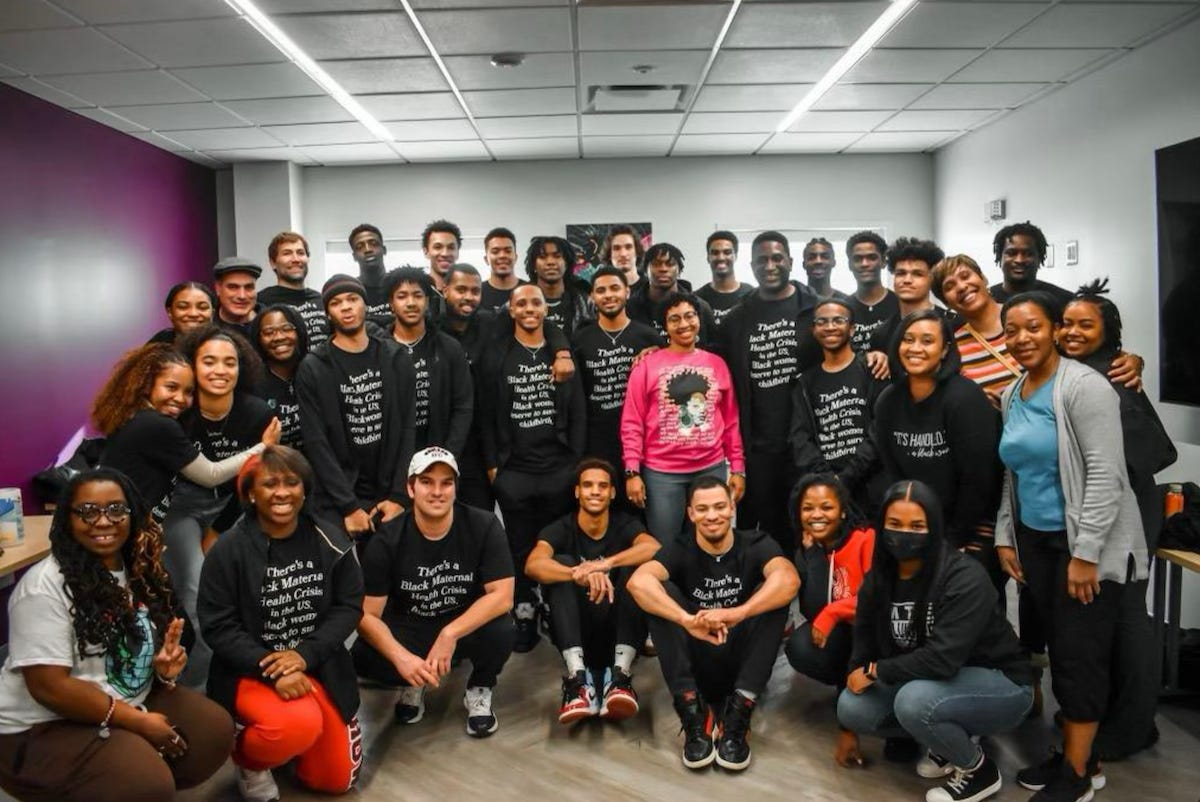
This past Saturday, Howard University’s Men’s Basketball Team won its first conference championship in three decades in a razor-thin thriller, capping off an historic season that has witnessed a culmination of Head Coach Kenneth Blakeney’s rebuilding efforts since being hired to helm the program in 2019.
The Bison haven’t been to the NCAA Division I Men’s Basketball Tournament (better known as “March Madness”) since before Bill Clinton was elected president, and today, at 2pm ET, they’ll face off against defending champion University of Kansas in the opening round.
And yet, it’s only the second most impressive thing the team has done this season.
Howard is one of the most prestigious colleges in the country and one of its leading HBCUs. The long list of notable alumni include Vice President Kamala Harris, Supreme Court Justice Thurgood Marshall, Zora Neale Hurston, Toni Morrison, and numerous other politicians, journalists, writers, scientists, engineers, actors, activists — the list goes on and on.
This past September, Coach Blakeney challenged the young men under his wing to choose a season-long social justice project that honors the legacy of activism at Howard. They could pick any issue for which to advocate, so long as they worked as a team to advance the cause.
The young men deliberated and came back to Blakeney with their choice: Black maternal health, one of the most overlooked public health disparities in a country that already isn’t known for its commitment to protecting the health of expectant mothers and pregnant people generally.
The team landed on this issue because of the recent overturning of Roe v. Wade and their place as male students on a campus where women make up more than 70 percent of the student body.
The statistics on Black maternal health in the United States are harrowing. According to the National Partnership for Women & Families, Black women are three to four times more likely to die from pregnancy-related causes than white women, which cannot be explained away by simply pointing to economic barriers. Black women and pregnant people across income and education levels are more vulnerable to fatal pregnancy outcomes than most economically-disadvantaged white women.
But how?
As with so many other traumatic barriers for Black Americans in the public square, it goes back to systemic racism. Even Black women with wealth and access to high quality health care environments still experience disproportionate fatal outcomes.
This is a sobering summary from “Research Overview of Maternal Mortality and Morbidity in the United States” by the Center for Reproductive Rights:
“Past and present experiences with racial discrimination shape Black patients’ interactions with their medical providers, and stereotypes, implicit bias, and mistrust continue to interfere with care. Studies show that Black patients are treated differently than White patients with the same symptoms, receiving fewer diagnostic and therapeutic interventions, and even less pain medication.”
It’s pretty severe. I encourage folks to attend a screening of the new documentary “Birthing Justice,” from executive producer and Olympic Track & Field Champion Allyson Felix, who experienced her own horrific complications during childbirth as a Black woman. The film brilliantly lays out how systemic racism lies at the root of all this.
Coach Blackeney and the staff at Howard embraced the team’s advocacy project, working over the past six months to bring greater attention to the issue and getting the D.C. community more involved along the way.
It started with the team attending a panel on Black maternal health at the Congressional Black Caucus Annual Legislative Conference, with Congresswomen Alma Adams (NC-12) and Lauren Underwood (IL-14), where they kicked off their season with a screening of “Birthing Justice.”
In October, the team invited Fatima Goss-Graves, President of the National Women’s Law Center, to campus for a discussion on Roe v. Wade, in order to contextualize the history of reproductive rights in the United States.
For MLK Day of Service, the team organized a full day of preparing pregnancy care kits at Mamatoto Village in D.C., a health clinic that centers Black women in the community. Numerous elected officials, including Members of Congress, joined D.C. residents—myself included—to do the basic labor of sorting supplies and assembling the kits. (On a personal note, I never expected to have so much fun stuffing diapers and other pregnancy items into Ziplocs.)
That same weekend, during halftime in a game against Morehouse, the teams joined together to present scholarships to single mothers at Howard. Later that month, they were invited to the White House to visit with Vice President Harris and discuss Black maternal health and also: barriers experienced by young Black men.
Last month, the team hosted their own screening of “Birthing Justice” for the student body on campus and organized a panel featuring team captain Jelani Williams, Taylor Ware (legislative aide to Rep. Adams), Brianna Green (Director of Operations at Mamatoto Village), and Jaidyn Gambrell, President of Mothers of the Mecca, a student organization for mothers studying at Howard.
It was after that screening that I had the chance to talk further with Coach Blakeney about the team. He and his young daughter were heading home and offered me a ride, and over the course of conversation, in which he humored my nerdy sports questions and talked about the team, it became crystal clear to me how the team has had so much success this season, on and off the court.
Coach Blakeney is the kind of leader who embodies service to others. After playing on two national championship teams at Duke under Mike Krzyzewski (and being appointed team captain his senior year), he threw himself into coaching. He has spent his life mentoring young men, perfecting it as an art, and it shows.
I’m sure he would tell you that the young men he’s leading into March Madness this week deserve all the credit for the effort they’ve put into centering Black mothers this season, and that’s certainly true. But it took someone to catalyze that motivation, and he was ready to spark the talent and empathy in these young men.
In the 84 years that March Madness has existed, #16 seed teams have only pulled off one upset against their #1 seed team opponents (2018’s thriller that saw UMBC defeat top seed Virginia in the opening round). It’s a tradition to identify underdogs in these tournaments that perform well as the “Cinderella” of March Madness.
I have no idea if the young men of Howard University will defeat reigning champ Kansas this afternoon, but if they put half as much heart on the court against the Jayhawks as they have into advocating for Black maternal health all season, we may all get a sports story for the ages and witness a real life fairy tale in the making.
If you’d like to join me in financially supporting the team—who are massively underfunded compared to their opponents—make a tax-deductible donation to The Mecca Society and keep this amazing program going strong.













Share this post